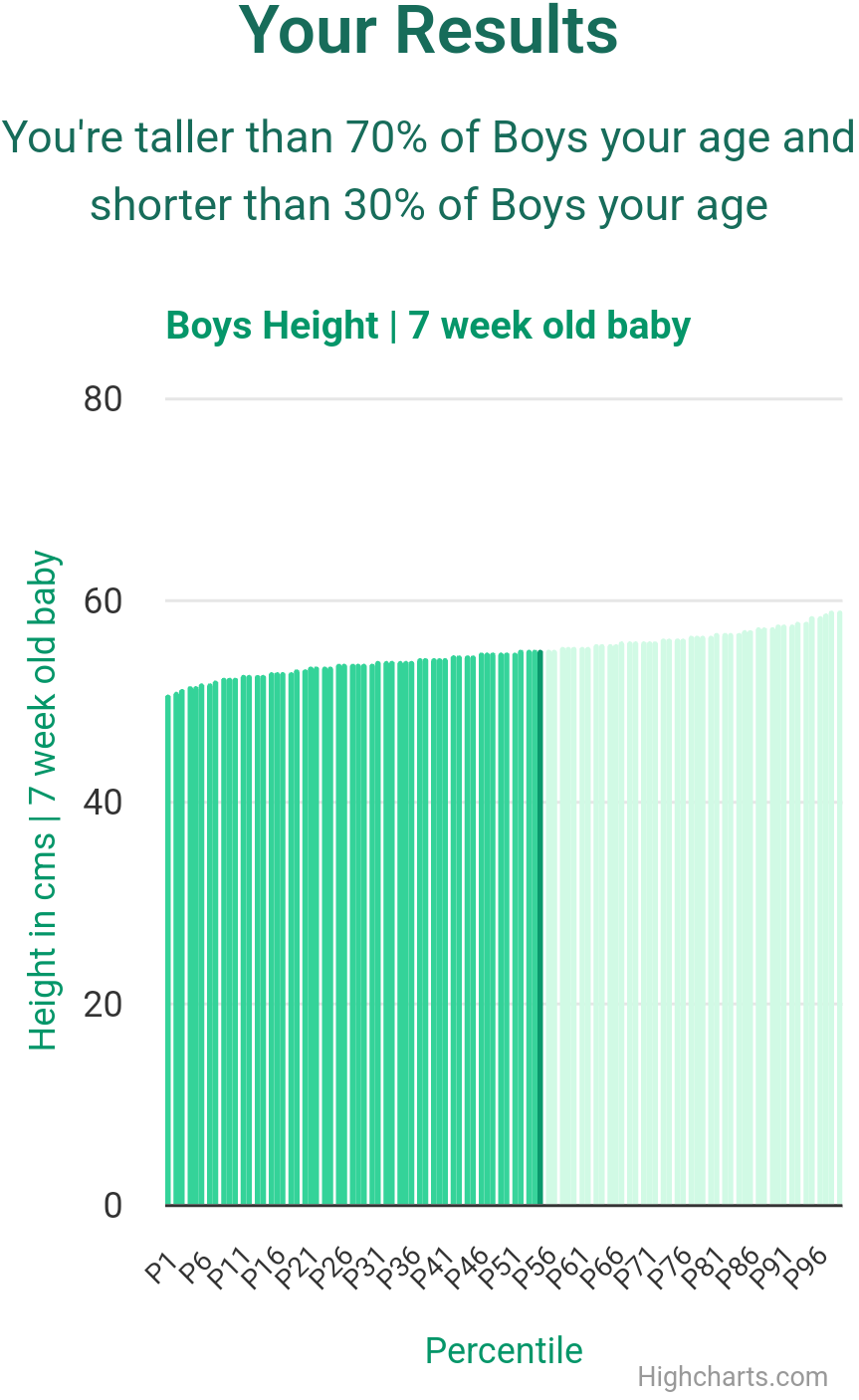Boys Height chart for babies 7 week old baby

General Summary: 7 week old baby boys height
In most cases, height measurements for 7 week old baby boys will be in the range between 46 and 53 cms. The average height for 7 week old baby boys is 50 cms, according to the CDC and anonymized data from users.
All Results
Enter your height measurements above to see how they compare
So far, we have recorded [0] height measurements for 7-week-old-baby boys on LifeMeasure!
(chart updates daily)
Growth and Development of 7-Week-Old Boys:
Height and Percentiles: Congratulations on your baby boy reaching seven weeks old! At this stage, the average height for newborn boys is typically around 21.5 to 23.5 inches (54 to 60 centimeters). Remember that every baby grows at their own pace, and there is a wide range of normal growth. Healthcare providers use growth charts to monitor your baby's growth and compare it to percentile ranges based on age and gender.
Here are some percentile ranges for reference:
5th percentile: Approximately 20.5 inches (52 centimeters)
50th percentile (average height): Around 22 inches (56 centimeters)
95th percentile: Approximately 23.5 inches (60 centimeters)
These percentiles can provide insight into how your baby's height compares to other seven-week-old boys.
Physical Development: At seven weeks old, your baby boy's physical development continues to progress. He may show improved head control and be able to hold it up for longer periods when supported. During tummy time, he may start to lift his head and chest off the surface, demonstrating increased strength in his neck and upper body.
As your baby boy grows, it's important to remember that his height is just one aspect of his overall growth and development. Babies at this age are also developing their weight, head circumference, and other physical features. Your healthcare provider will track these measurements to ensure your baby is growing proportionally and within the expected range.
Steady Growth Spurt
During the first few months of life, your baby boy will experience a steady growth spurt. By 7 weeks old, he may have gained approximately 1 to 1.5 inches (2.5 to 3.8 centimeters) since birth. This growth indicates that his bones and muscles are developing as expected. Your healthcare provider will assess your baby's height and provide guidance on his growth progress.
Tracking Growth with Check-ups
Regular check-ups with your healthcare provider play a vital role in monitoring your baby's growth and development. During these visits, your baby's height, weight, and overall health will be assessed. Your healthcare provider will compare his growth measurements to standard growth charts, ensuring he is within the expected range. These milestones help track your baby's progress and provide valuable insights into his overall well-being.
Feeding and Nutrition: Feeding is vital for your baby's growth and development. Whether you are breastfeeding or using formula, continue to offer frequent feedings on demand, responding to your baby's cues of hunger. By seven weeks old, your baby may still need to feed approximately 8 to 12 times a day as he continues to grow and meet his nutritional needs.
Sleep Patterns: Sleep patterns can vary among babies, but by seven weeks old, your baby may begin to establish a more predictable sleep routine. He may sleep for approximately 14 to 17 hours a day, with longer stretches of sleep at night. Creating a calm and soothing bedtime routine can help promote healthy sleep habits.
Sensory Development: Your baby's senses are becoming more refined. At seven weeks old, he may show increased responsiveness to his environment and display interest in visual stimuli, such as faces, colors, and patterns. He may also start to track moving objects with his eyes and turn his head toward sounds.
Cognitive Development: Although still in the early stages, your baby's cognitive abilities are expanding. He may demonstrate heightened alertness and awareness of his surroundings. Simple interactions like talking, singing, and gentle play can stimulate his cognitive development and foster a sense of security and engagement.
Bonding and Emotional Development: Your presence and responsive care significantly influence your baby's emotional development. Continue to engage in nurturing activities, such as cuddling, comforting, and speaking softly to him. Your love and affection help create a secure attachment and promote emotional well-being.
Parental Support: As parents, your support and love are invaluable during this time. Trust your instincts and take care of yourselves as you care for your baby. Seek support when needed, whether from healthcare professionals, family, or friends. Remember, you are doing a wonderful job nurturing your baby's growth and development. Remember, you are not alone, and there are resources available to support you.
Well-Baby Visits: Regular well-baby visits with your healthcare provider are important for monitoring your baby's growth, development, and overall health. These visits offer an opportunity to address any concerns, receive guidance on milestones, and ensure your baby is thriving.
Enjoy this special time with your little one as he continues to grow and explore the world around him. Celebrate each milestone and cherish the precious moments. You are laying the foundation for a lifetime of love, support, and growth.
What to Expect
At 7 weeks old, your baby boy's head control and neck strength will continue to improve. He may start to lift his head briefly while lying on his tummy or when supported in an upright position. Encourage his physical development by providing opportunities for supervised tummy time and supported sitting.
Some Tips
Engage in interactive activities that encourage reaching and stretching, such as dangling toys within his reach during tummy time.
Create a safe and stimulating environment for your baby boy to explore his surroundings and promote his physical development.
Provide ample opportunities for gentle stretching and movement exercises to support his growing muscles and flexibility.
Remember, each baby develops at their own pace, and these milestones serve as general guidelines. If you have any concerns about your baby boy's height or growth, consult with your healthcare provider for personalized advice and guidance.
See more ages